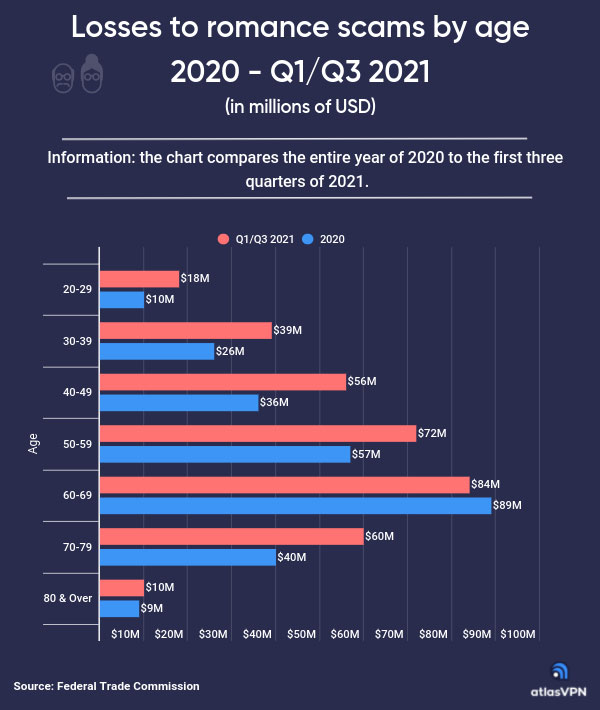Cybersecurity awareness is not just a necessity for businesses and internet-facing organizations. Consumers, especially lonely hearts experiencing life’s so-called golden years, are prime targets for romance scams and fraud assaults.
Research shows that romance scams are at an all-time high. Even younger folks who share too much about their affairs of the heart on dating sites and social media could become ripe targets for love scams and fraud.
The FBI defines romance scams as situations in which a criminal adopts a fake online identity to gain a victim’s affection and trust. The scammer then uses the illusion of a romantic or close relationship to manipulate and/or steal from the victim. Romance scammers are experts at seeming to be genuine, caring, and believable.
These con artists lurk on most dating and social media sites. They are eager to take advantage of the lonely who now fill cyberspace, warns AARP. Seeking romantic bliss online can have a major financial downside, noted a recent AARP advisory for consumers over the age of 50.
Three in 10 U.S. adults have used a dating website or app, notes a Pew Research Center report called Project Might. That includes one in five Americans ages 50 to 64. Clearly, some people looking for romance online put themselves in easy reach of cyber-romance thieves.
Targeting Seniors
Social media is prime hunting grounds for romance fraudsters. Phony suitors in growing numbers reach out to potential victims they spot on Facebook or Instagram, according to the Federal Trade Commission. Complaints about romance scams the FTC fielded jumped from 11,235 cases in 2016 to 52,593 in 2020.
Reported losses topped $300 million, a nearly fourfold increase over the same period. It seems the older the romance target, the heavier the financial toll, according to the FTC. The median individual loss from a romance scam for people 70 and over was $9,475 compared to $2,500 across all age groups.
Another danger with romance scams is that they can lead the victim into potentially criminal actions as well. International criminal gangs use dating sites to recruit unwitting “money mules” to launder ill-gotten funds through their bank accounts or other means.
For example, the FBI in September 2021 reported a rising trend of romance fraudsters enticing their sweetheart targets to make fraudulent cryptocurrency investments.
Romance scams cost Americans almost $350 million last year, according to Edvardas Garbenis, cybersecurity researcher and publisher at Atlas VPN. The drastic social changes imposed since the pandemic may be a major cause.
“Telling people to avoid online dating in times of isolation is not going to work. However, all of us can do our best to educate ourselves and others about the dangers that lurk online,” he told TechNewsWorld.
Covid Made Me Do It
Last year was one of the loneliest years for many people. For those who have been monitoring their emotional health, it might be obvious why there is a rise in romantic scams, Garbenis said.
“People did not get used to being alone during 2020. On the contrary, people report that 2021 was even worse than 2020 in terms of their well-being,” he observed.
A recent government telephone survey of 11,000 Medicare members disclosed that 40 percent reported feeling less socially connected to family and friends than they did in November 2020. Those results lay the foundation for the alarming uptick in romance scams. Impersonators found the pandemic to be a treat, according to Garbenis.
“They have a legitimate excuse as to why they cannot meet up in person, at least for now. This allowed fraudsters to carry out romance scams on a larger scale than ever before,” he said.
Fighting Back
Garbenis is driven with a mission to scan the ever-evolving cybercrime landscape to inform the public, including his VPN subscribers, about the latest online threats.
That led him to post a blog on the AtlasVPN website in late January to alert customers. AtlasVPN extracted data from an FTC report. That information is quite hidden if one does not know where the FTC stores it, he explained.
AtlasVPN analyzed the FTC data and posted its own summary of the worsening threat to those seeking love online. That post focused on findings that heartbroken and lonely victims lost upwards of $343 million in the first three quarters of 2021, noted Garbenis. So far, no data for Q4 of last year is available.
TechNewsWorld reviewed several alerts and reports by the FBI, Pew Research Center, and AARP providing similar statistics and warnings. Financial losses from these sources through last year lacked more current figures beyond the third quarter of 2021.
“Based on the information that we do have, it is safe to assume that romance scams caused somewhere around $500 million in damages throughout the entire year,” Garbenis said.
In 2020, impersonators swindled $268 million from victims of all age groups. In Q1-Q3 2021, monetary damages exceeded $342 million, representing a 27.7 percent growth, he reiterated.
Factoring Figures
In the FTC’s chart below, “Losses to romances scams by age,” it’s clear to see that in six out of seven age groups, the money lost to romance scams surpasses those of 2020. That money amount holds even though the first three quarters of 2021 are compared to the entire 2020, observed Garbenis.

Perhaps the most surprising finding is that people aged 60 to 69 lost significantly more money than all other groups in 2020 and 2021. This was the case in 2019, as well, he noted.
Romance scam losses among individuals aged 60 and over climbed from roughly $84 million in 2019 to around $139 million in 2020. The 60-to-69 and 70-to-79 age groups were hit the heaviest, accounting for $129 million of the total reported losses in 2020.
Cumulative losses of $129 million in 2020 and $145 million in Q1-Q3 2021 also mean that romance scams were the most financially damaging fraud category for seniors, he offered from the research data.
Younger Americans are not immune to romantic impersonators, either. People aged 20 to 59 lost $130 million in 2020 and $187 million in Q1-Q3 2021. That growth was 44 percent even without the data on losses in Q4.
In short, all age groups are struggling with impersonator scams on dating sites or other social media platforms.
How a VPN Can Help
Building relationships online is a convenient way to stay connected. Perhaps the best takeaway from the data is to keep your heart open but your wallet closed at least until you meet your newfound flame in person.
VPNs or virtual private networks can offer an increased measure of avoiding scams, suggested Garbenis. The added cybersafety provided by connecting to dating sites with a VPN is supported by a few good reasons, according to Garbenis.
“First, it changes your IP address. This allows people to access dating sites that might not be available in their country,” he told TechNewsWorld.
For example, many Arab countries have strict internet restrictions that block any sites that go against Islamic values. So if they deem a dating website to be against it, UAE citizens, for example, are out of luck.
“That is why the UAE has the largest VPN adoption rate globally. Other Arab countries are also at the top of the list,” he said.
Moreover, using a VPN is very important when accessing dating sites on public Wi-Fi. That is by far the easiest way for hackers to steal your login information, Garbenis added.
“Public Wi-Fi’s have terrible security in this regard, and a VPN connection completely solves the problem. Having your dating profile stolen could have embarrassing consequences if one is not careful, among other things,” he said.
Tips for Avoiding Romance Scams
The FBI offers advice to avoid being duped by swindlers who use the illusion of affection and trust to manipulate or steal from their victims. Remember:
- Scammers use details you share on social media and dating sites to better understand and target you;
- Go slowly and ask lots of questions;
- Use online searches to see if the person’s photo and profile have been used elsewhere;
- Beware if the individual quickly asks you to leave a dating service or social media site to communicate directly;
- Beware of attempts to isolate you from friends and family or requests to send inappropriate photos or financial information that could later be used to extort you;
- Be suspicious of promises to meet in person that are always canceled with various excuses;
- Never send money to anyone you have only communicated with online or by phone.
















































